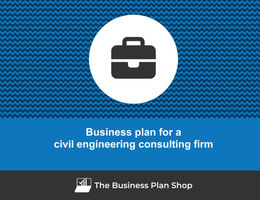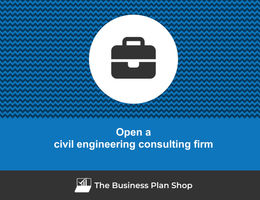How to create a financial forecast for a civil engineering consulting firm?
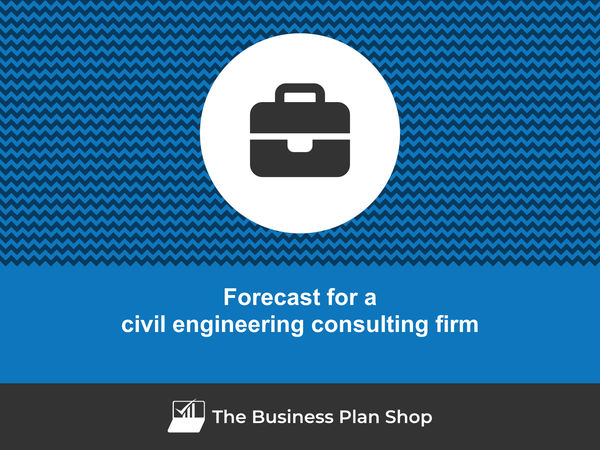
Developing and maintaining an up-to-date financial forecast for your civil engineering consulting firm is key in order to maintain visibility on your business’s future cash flows.
If you feel overwhelmed at the thought of putting together a civil engineering consulting firm financial forecast then don’t worry as this guide is here to help you.
We'll cover everything from: the main objectives of a financial forecast, the data you need to gather before starting, to the tables that compose it, and the tools that will help you create and maintain your forecast efficiently.
Let's get started!
Why create and maintain a financial forecast for a civil engineering consulting firm?
Creating and maintaining an up-to-date financial forecast is the only way to steer the development of your civil engineering consulting firm and ensure that it can be financially viable in the years to come.
A financial plan for a civil engineering consulting firm enables you to look at your business in detail - from income to operating costs and investments - to evaluate its expected profitability and future cash flows.
This gives you the visibility needed to plan future investments and expansion with confidence.
And, when your trading environment gets tougher, having an up to date civil engineering consulting firm forecast enables you to detect potential upcoming financing shortfalls in advance, enabling you to make adjustments or secure financing before you run out of cash.
It’s also important to remember that your civil engineering consulting firm's financial forecast will be essential when looking for financing. You can be 100% certain that banks and investors will ask to see your numbers, so make sure they’re set out accurately and attractively.
Need a convincing business plan?
The Business Plan Shop makes it easy to create a financial forecast to assess the potential profitability of your projects, and write a business plan that’ll wow investors.

What information is needed to build a civil engineering consulting firm financial forecast?
The quality of your inputs is key when it comes to financial modelling: no matter how good the model is, if your inputs are off, so will the forecast.
If you are building a financial plan to start a civil engineering consulting firm, you will need to have done your market research and have a clear picture of your sales and marketing strategies so that you can project revenues with confidence.
You will also need to have a clear idea of what resources will be required to operate the civil engineering consulting firm on a daily basis, and to have done your research with regard to the equipment needed to launch your venture (see further down this guide).
If you are creating a financial forecast of an existing civil engineering consulting firm, things are usually simpler as you will be able to use your historical accounting data as a budgeting base, and complement that with your team’s view on what lies ahead for the years to come.
Let's now zoom in on what will go in your civil engineering consulting firm's financial forecast.
The sales forecast for a civil engineering consulting firm
From experience, it is usually best to start creating your civil engineering consulting firm financial forecast by your sales forecast.
To create an accurate sales forecast for your civil engineering consulting firm, you will have to rely on the data collected in your market research, or if you're running an existing civil engineering consulting firm, the historical data of the business, to estimate two key variables:
- The average price
- The number of monthly transactions
To get there, you will need to consider the following factors:
- Economic conditions: Economic conditions can have a significant impact on the average price of your consulting services. For example, during a recession, clients may be more price-sensitive and demand lower prices, resulting in a decrease in your average price per project.
- Industry trends: Changes in industry trends can also affect your average price. For instance, if there is a shift towards sustainable or green construction practices, clients may be willing to pay a premium for your consulting services that specialize in this area.
- Competition: The level of competition in the civil engineering consulting market can also impact your average price. If there is a high level of competition, you may need to lower your prices to remain competitive and attract clients.
- Demand for specific services: The demand for specific services can also influence your average price. If there is a high demand for a particular service, you may be able to charge a higher price for it, while a decrease in demand may result in lower prices.
- Cost of materials and labor: The cost of materials and labor can have a direct impact on your average price. If the cost of materials and labor increases, you may need to adjust your prices to maintain your profit margins.
Once you have an idea of what your future sales will look like, it will be time to work on your overhead budget. Let’s see what this entails.
Need a convincing business plan?
The Business Plan Shop makes it easy to create a financial forecast to assess the potential profitability of your projects, and write a business plan that’ll wow investors.

The operating expenses for a civil engineering consulting firm
The next step is to estimate the expenses needed to run your civil engineering consulting firm on a day-to-day basis.
These will vary based on the level of sales expected, and the location and size of your business.
But your civil engineering consulting firm's operating expenses should include the following items at a minimum:
- Staff costs: This includes salaries, benefits, and payroll taxes for all employees, including engineers, project managers, administrative staff, and support staff.
- Accountancy fees: Your firm will need to hire an accountant to manage your financial records, prepare tax returns, and provide financial advice.
- Insurance costs: As a civil engineering consulting firm, you will need to have insurance to protect your business from potential risks and liabilities, such as professional liability insurance, general liability insurance, and workers' compensation insurance.
- Software licenses: Your firm will need to purchase licenses for various software programs, such as engineering design software, project management software, and accounting software.
- Banking fees: This includes fees for maintaining business bank accounts, wire transfers, and other banking services.
- Rent and utilities: Your firm will need to pay for office space, utilities, and other related expenses, such as internet and phone services.
- Marketing and advertising: To attract clients and promote your services, you will need to invest in marketing and advertising efforts, such as creating a website, attending industry events, and printing marketing materials.
- Travel expenses: As a consulting firm, you may need to travel to meet with clients or visit project sites, and these expenses should be included in your operating budget.
- Professional development: To stay current with industry trends and advancements, your firm may need to invest in training and continuing education for employees.
- Office supplies: This includes basic office supplies, such as paper, pens, and printer ink, as well as any specialized supplies needed for engineering projects.
- Subcontractor fees: Your firm may need to hire subcontractors for certain projects, and their fees should be included in your operating expenses.
- Legal fees: Your firm may need to consult with a lawyer for various legal matters, such as contract reviews or disputes, and these fees should be included in your budget.
- Office maintenance: This includes cleaning services, repairs, and maintenance for your office space and equipment.
- Taxes and licenses: Your firm will need to pay various taxes and obtain necessary licenses to operate legally.
- Employee benefits: In addition to salaries, your firm may offer benefits such as health insurance, retirement plans, and paid time off, which should be included in your operating budget.
This list is, of course, not exhaustive, and you'll have to adapt it according to your precise business model and size. A small civil engineering consulting firm might not have the same level of expenditure as a larger one, for example.
What investments are needed to start or grow a civil engineering consulting firm?
Your civil engineering consulting firm financial forecast will also need to include the capital expenditures (aka investments in plain English) and initial working capital items required for the creation or development of your business.
For a civil engineering consulting firm, these could include:
- Office Equipment: This includes items such as computers, printers, and other necessary equipment for your office space. These are considered fixed assets as they are not intended for resale and have a useful life of more than one year.
- Surveying and Mapping Equipment: As a civil engineering consulting firm, you will need to invest in equipment such as GPS devices, total stations, and other surveying tools to accurately measure and map out project sites.
- Software and Technology: In today's digital age, having the right software and technology is crucial for a consulting firm. This may include project management software, CAD software, and other technology tools specific to the civil engineering industry.
- Furniture and Fixtures: This includes items such as desks, chairs, and other furniture needed for your office space. These are also considered fixed assets as they have a useful life of more than one year.
- Vehicles: Depending on the size and scope of your projects, you may need to invest in vehicles such as trucks or utility vans to transport equipment and materials to project sites. These are considered fixed assets as they have a useful life of more than one year.
Again, this list will need to be adjusted according to the size and ambitions of your civil engineering consulting firm.
Need a convincing business plan?
The Business Plan Shop makes it easy to create a financial forecast to assess the potential profitability of your projects, and write a business plan that’ll wow investors.

The financing plan of your civil engineering consulting firm
The next step in the creation of your financial forecast for your civil engineering consulting firm is to think about how you might finance your business.
You will have to assess how much capital will come from shareholders (equity) and how much can be secured through banks.
Bank loans will have to be modelled so that you can separate the interest expenses from the repayments of principal, and include all this data in your forecast.
Issuing share capital and obtaining a bank loan are two of the most common ways that entrepreneurs finance their businesses.
What tables compose the financial plan for a civil engineering consulting firm?
Now let's have a look at the main output tables of your civil engineering consulting firm's financial forecast.
The profit & loss forecast
The forecasted profit & loss statement will enable you to visualise your civil engineering consulting firm's expected growth and profitability over the next three to five years.
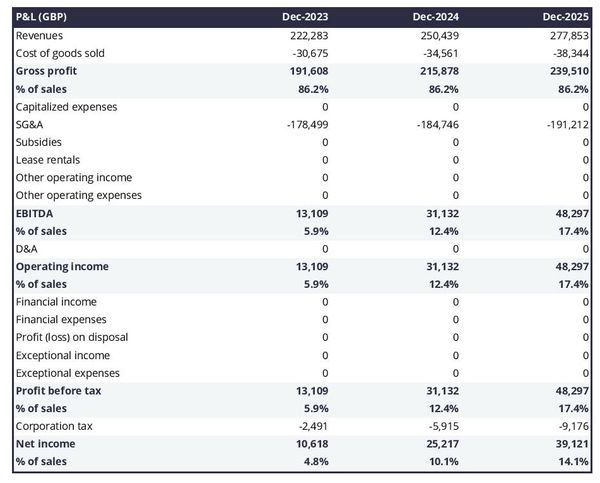
A financially viable P&L statement for a civil engineering consulting firm should normally show:
- Sales growing above inflation
- Stable or expanding (ideally) profit margins
- A net profit
This will of course depend on the stage of your business: a new venture might be loss-making until it reaches its breakeven point in year 2 or 3, for example.
The projected balance sheet
Your civil engineering consulting firm's forecasted balance sheet enables you to assess your financial structure and working capital requirements.
It is composed of three types of elements: assets, liabilities and equity:
- Assets: represent what the business owns and uses to produce cash flows. It includes resources such as cash, equipment, and accounts receivable (money owed by clients).
- Liabilities: represent funds advanced to the business by lenders and other creditors. It includes items such as accounts payable (money owed to suppliers), taxes due and loans.
- Equity: is the combination of what has been invested by the business owners and the cumulative profits and losses generated by the business to date (which are called retained earnings). Equity is a proxy for the value of the owner's stake in the business.
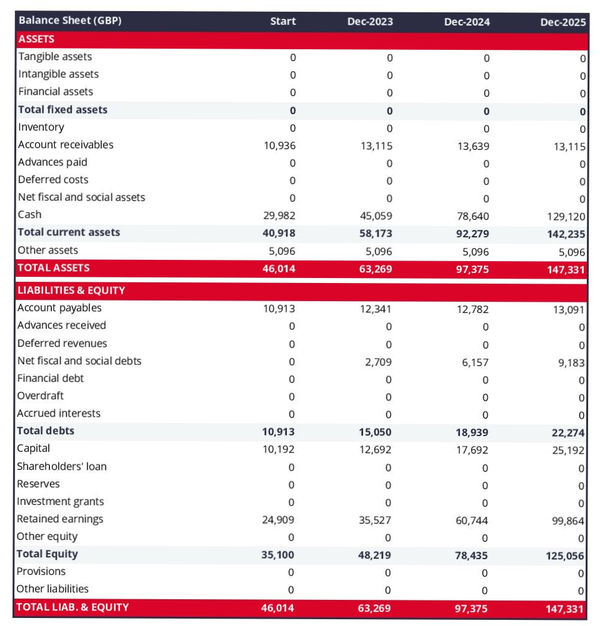
The cash flow projection
The cash flow forecast of your civil engineering consulting firm will show how much cash the business is expected to generate or consume over the next three to five years.
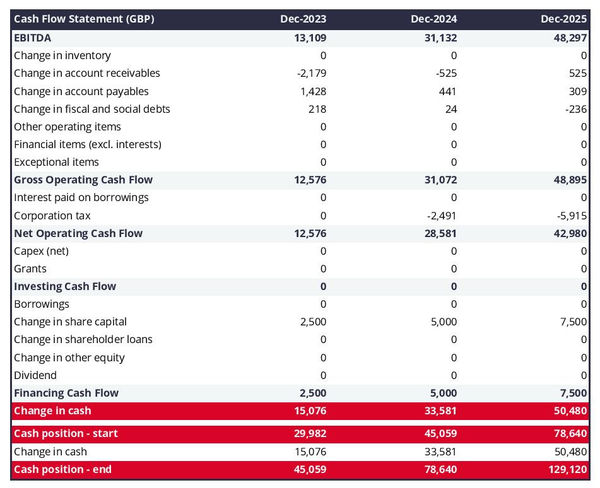
There are multiple ways of presenting a cash flow forecast but from experience, it is better to organise it by nature in order to clearly show these elements:
- Operating cash flow: how much cash is generated by the civil engineering consulting firm's operations
- Investing cash flow: what is the business investing to expand or maintain its equipment
- Financing cash flow: is the business raising additional funds or repaying financiers (debt repayment, dividends)
Your cash flow forecast is the most important element of your overall financial projection and that’s where you should focus your attention to ensure that your civil engineering consulting firm is adequately funded.
Note: if you are preparing a financial forecast in order to try to secure funding, you will need to include both a yearly and monthly cash flow forecast in your civil engineering consulting firm's financial plan.
Need a convincing business plan?
The Business Plan Shop makes it easy to create a financial forecast to assess the potential profitability of your projects, and write a business plan that’ll wow investors.

Which tool should you use to create your civil engineering consulting firm's financial forecast?
Using the right tool or solution will make the creation of your civil engineering consulting firm's financial forecast much easier than it sounds. Let’s explore the main options.
Using online financial forecasting software to build your civil engineering consulting firm's projections
The modern and easiest way is to use professional online financial forecasting software such as the one we offer at The Business Plan Shop.
There are several advantages to using specialised software:
- You can easily create your financial forecast by letting the software take care of the financial calculations for you without errors
- You have access to complete financial forecast templates
- You get a complete financial forecast ready to be sent to your bank or investors
- You can easily track your actual financial performance against your financial forecast, and recalibrate your forecast as the year goes by
- You can create scenarios to stress test your forecast's main assumptions
- You can easily update your forecast as time goes by to maintain visibility on future cash flows
- You have a friendly support team on standby to assist you when you are stuck
- It’s cost-efficient and much cheaper than using an accountant or consultant (see below)
If you are interested in this type of solution, you can try our forecasting software for free by signing up here.
Calling in a financial consultant or chartered accountant
Outsourcing the creation of your civil engineering consulting firm financial forecast is another possible solution.
This will cost more than using software as you can expect as your price will have to cover the accountant’s time, software cost, and profit margin.
Price can vary greatly based on the complexity of your business. For a small business, from experience, a simple three-year financial forecast (including a balance sheet, income statement, and cash flow statement) will start at around £700 or $1,000.
Bear in mind that this is for forecasts produced at a single point in time, updating or tracking your forecast against actuals will cost extra.
If you decide to outsource your forecasting:
- Make sure the professional has direct experience in your industry and is able to challenge your assumptions constructively.
- Steer away from consultants using sectorial ratios to build their client’s financial forecasts (these projections are worthless for a small business).
Why not use a spreadsheet such as Excel or Google Sheets to build your civil engineering consulting firm's financial forecast?
You and your financial partners need numbers you can trust. Unless you have studied finance or accounting, creating a trustworthy and error-free civil engineering consulting firm financial forecast on a spreadsheet is likely to prove challenging.
Financial modelling is very technical by nature and requires a solid grasp of accounting principles to be done without errors. This means that using spreadsheet software like Excel or Google Sheets to create accurate financial forecasts is out of reach for most business owners.
Creating forecasts in Excel is also inefficient nowadays:
- Software has advanced to the point where forecasting can be done much faster and more accurately than manually on a spreadsheet.
- With artificial intelligence, the software is capable of detecting mistakes and helping decision-making.
Spreadsheets are versatile tools but they are not tailor-made for reporting. Importing your civil engineering consulting firm's accounting data in Excel to track actual vs. forecast is incredibly manual and tedious (and so is keeping forecasts up to date). It is much faster to use dedicated financial planning tools like The Business Plan Shop which are built specially for this.
Need a convincing business plan?
The Business Plan Shop makes it easy to create a financial forecast to assess the potential profitability of your projects, and write a business plan that’ll wow investors.

Use our financial projection templates for inspiration
The Business Plan Shop has dozens of financial forecasting templates available.
Our examples contain both the financial forecast, and a written business plan which presents, in detail, the company, the team, the strategy, and the medium-term objectives.
Whether you are just starting out or already have your own civil engineering consulting firm, looking at our template is always a good way to get ideas on how to model financial items and what to write when creating a business plan to secure funding.
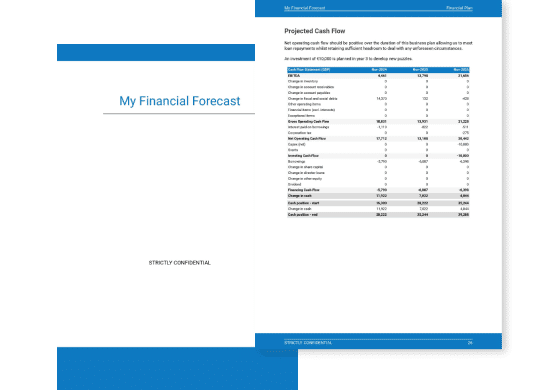
Takeaways
- A financial forecast shows expected growth, profitability, and cash generation metrics for your civil engineering consulting firm.
- Tracking actuals vs. forecast and having an up-to-date financial forecast is key to maintaining visibility on your future cash flows.
- Using financial forecasting software is the modern way of creating and maintaining financial projections.
We hope that this guide helped you gain a clearer perspective on the steps needed to create the financial forecast for a civil engineering consulting firm. Don't hesitate to contact us if you have any questions!
Need a convincing business plan?
The Business Plan Shop makes it easy to create a financial forecast to assess the potential profitability of your projects, and write a business plan that’ll wow investors.

Also on The Business Plan Shop
- Financial forecast example
- How to project revenues for a business?
- Financial forecast template for a business idea
Know someone who runs a civil engineering consulting firm? Share our business guide with them!


